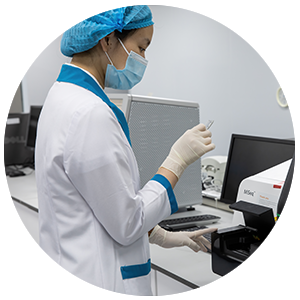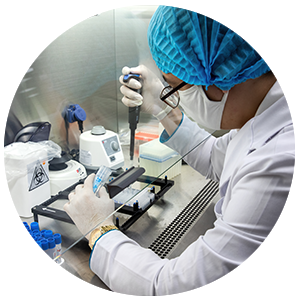COVID researchers are working at breakneck speed to learn about the variant's transmissibility, severity and ability to evade vaccines.
Less than a week has passed since scientists in Botswana and South Africa warned the world about a new fast-spreading SARS-CoV-2 variant now known as Omicron. Researchers worldwide are racing to understand the threat this variant - now confirmed in more than 20 countries - poses to the world. However, it could take scientists weeks to paint a more complete picture of Omicron, and to understand its transmissibility and severity, as well as its ability to evade vaccines and cause disease. its reinfection.
.
“Wherever I go, people say: tell us more about Omicron,” says Senjuti Saha, a molecular microbiologist and director of the Children's Health Research Foundation in Dacca, Bangladesh. "There's very little understanding of what's going on, and that's true, even among scientists."
.
The rapid rise of Omicron in South Africa is what worries researchers most, as it suggests the variant could cause explosive increases in COVID-19 cases elsewhere. On 1 December, South Africa recorded 8,561 cases, up from 3,402 cases reported on 26 November and several hundred cases per day in mid-November, with most of the increase occurring in Gauteng province , home of Johannesburg.
.
Epidemiologists measure epidemic growth using R, the average number of new cases spread per infection. In late November, South Africa's National Institute of Communicable Diseases (NICD) in Johannesburg determined that the R value was > 2 in Gauteng. Richard Lessels, an infectious disease physician at the University of KwaZulu-Natal in Durban, South Africa, told the press in a press conference last week that that level of growth was last observed in the early days of the virus. epidemic.
.
Gauteng's R value of <1 was much lower in September - when Delta was the dominant variant and cases were falling - suggesting that Omicron is likely to spread much faster and infect more people than Delta, said Tom Wenseleers, an evolutionary biologist at KU-Leuven, Belgium. Based on the increase in COVID-19 cases and sequencing data, Wenseleers estimates that Omicron could infect three to six times as many people as Delta, over the same time period. “That is a huge advantage for the virus — but not for us,” he added.
.
Christian Althaus, a computational epidemiologist at the University of Bern in Switzerland, said researchers will monitor how Omicron spreads in other parts of South Africa and globally to better understand its potential. its transmission. Increased surveillance in South Africa may have led researchers to overestimate Omicron's rapid growth. But if this pattern repeats in other countries, that is very strong evidence that Omicron has a transmission advantage, Althaus added. “If it doesn't happen, for example in European countries, that means things are a bit more complicated and highly dependent on the immunological context. So we have to wait.”
.
Although genomic sequencing is needed to confirm Omicron cases, some PCR tests can pick up signatures of the variant that differentiate it from Delta. On the basis of this signal, there are preliminary signs that cases, although very low in number, are increasing in the UK. “It's certainly not what we want to see right now and shows that Omicron may actually have a transmission advantage in the UK as well,” Althaus added.
.
CAN OMICRON OVERCOME IMMUNITY CAUSED BY VACCINE OR INFECTION?
The rapid rise of the South African variant suggests that it has some ability to overcome immunity. About a quarter of South Africa's population is fully vaccinated, and it's likely that a large portion of the population was infected with SARS-CoV-2 in previous waves, Wenseleers said, based on the elevated death rate since the pandemic began.
.
In this context, Omicron's success in southern Africa may be largely due to its ability to infect people who have recovered from COVID-19 infection caused by Delta and other variants, as well as other vaccinated people. A December 2 manuscript from a researcher at NiCd found that the likelihood of reinfection in South Africa has increased, as Omicron spreads. “Unfortunately, this is the perfect environment for immune escape variants to develop,” Althaus said.
.
Aris Katzourakis, an expert on virus evolution at the University of Oxford, UK, said how the variant spreads elsewhere depends on factors such as vaccination and previous infection rates. "If you throw it into the mix in a highly vaccinated population that has abandoned other control measures, it may have an advantage there."
.
The researchers wanted to measure Omicron's ability to evade immune responses and the protection they provide. For example, a team led by Penny Moore, a virologist at NICD and the University of the Witwatersrand in Johannesburg, is measuring the ability of antibodies triggered by previous infection to neutralize, or block the virus and vaccination to prevent Omicron from infecting cells, in a laboratory test. Her team is creating 'pseudovirus' particles - an engineered version of HIV that uses the SARS-CoV-2 spike protein to infect cells - to fit Omicron, which contains up to 32 changes change to increase dramatically.
.
Another research team based in South Africa, led by virologist Alex Sigal at the African Health Research Institute in Durban, is conducting similar tests on virus-neutralizing antibodies using infectious SARS-CoV-2 particles. So a research team led by Pei-Yong Shi, a virologist at the University of Texas Medical Branch at Galveston, is collaborating with Pfizer–BioNtech to determine how their vaccine stacks up against Omicron. “I was really worried when I saw the spike in the mutant group,” he said. "We just have to wait for the results."
.
Previous studies of the Omicron spike mutation - specifically in the receptor recognition region on human cells - showed that this variant reduces the potency of neutralizing antibodies. For example, in a September 2021 paper, a research team co-led by Paul Bieniasz, a virologist at Rockefeller University in New York City, designed a highly mutated version of spike – in a virus unlikely to cause COVID-19 – shares many mutations with Omicron. The 'polymorphic spike' demonstrated complete resistance to neutralizing antibodies from most people they tested who had received two doses of the RNA vaccine or had recovered from COVID-19. With Omicron, “we expect to have a significant hit,” Bieniasz said.
.
WHAT WOULD A VACCINE AGAINST OMICRON LIKE?
If Omicron can evade neutralizing antibodies, that doesn't mean immune responses triggered by vaccination and previous infections won't be able to protect against the variant. Miles Davenport, an immunologist at the University of New South Wales in Sydney, Australia, said immunology studies suggest that relatively low levels of neutralizing antibodies may protect people from forms of COVID-19. serious.
.
Other parts of the immune system, especially T cells, may be less affected by Omicron mutations than antibody responses. Researchers in South Africa plan to measure the activity of T cells and another immune factor called natural killer cells, which may be especially important for protecting against severe COVID-19. important, says Shabir Madhi, a vaccinologist at the University of the Witwatersrand.
.
Madhi, who led the COVID-19 vaccine trials in South Africa, is also part of the effort to conduct epidemiological studies on the vaccine's effectiveness against Omicron. There are anecdotal reports of breakthrough infections in all three vaccines that have been used in South Africa - Johnson & Johnson, Pfizer – BioNtech and Oxford – AstraZeneca. But Madhi says researchers will want to quantify the level of protection provided by the vaccine, as well as previous infection with Omicron.
.
He suspects the results will be reminiscent of how the AstraZeneca–Oxford vaccine performed against the Beta variant, an immune-evading variant that was identified in South Africa in late 2020. A study led by Madhi showed the vaccine offered little protection against mild disease and moderate cases in relatively young people, while a real-world analysis in Canada showed more than 80% protection against hospitalization.
.
If Omicron behaves similarly, Madhi said, “we will see a large number of cases. We're going to see a lot of breakthrough infections, a lot of reinfections. But there will be a difference in the rate of cases in the community compared to the rate of hospitalization.” Madhi said initial reports suggest that most breakthrough infections with Omicron were mild. “For me, that's a positive sign.”
.
DO CURRENT ENHANCEMENTS IMPROVE PROTECTION AGAINST OMICRON?
The threat from Omicron has prompted some wealthy countries, such as the UK, to accelerate and expand the rollout of COVID vaccine boosters. But it's unclear how effective these extra doses will be.
.
According to Bieniasz, the third dose boosted levels of neutralizing antibodies, and it's possible that this could counteract Omicron's ability to evade these antibodies. His team's research on spike polymorphisms showed that people who had recovered from COVID-19 months before receiving their shots had antibodies that were still able to block the spike mutation. To Bieniasz, those results suggest that people who are repeatedly exposed to the SARS-CoV-2 spike protein, be it through infection or booster doses, “are quite likely to have neutralizing activity against Omicron.”
.
DOES OMICRON CAUSE Milder or Severe Disease THAN PREVIOUS VARIATIONS?
Initial reports linked Omicron to mild illness, raising hopes that the variant may be less severe than some predecessors. But these reports - often based on anecdotes or anecdotal data - can be misleading, warns Müge Çevik, an infectious disease expert at the University of St Andrews, UK. “Everyone is trying to find some data that can guide us,” she said. But it's very difficult at the moment."
.
A major challenge is assessing whether the severity of a variant is controlling for the many confounding variables that can influence the course of the disease, especially when outbreaks are geographical. For example, reports of mild illness from Omicron infection in South Africa may reflect the fact that the country has a relatively young population, many of whom have been exposed to SARS-CoV-2.
.
In the early days of the Delta outbreak, there were reports that this variant caused more severe illness in children than other variants — an association that disintegrated as more data was collected, Çevik speak.
.
Researchers will look for data on Omicron infections in other countries. Geographic spread and larger sample sizes as cases accumulate will give researchers a better idea of how generalizable the initial anecdotes are to the demographics of a given population. comparison group. This will allow scientists to better control for important factors, such as age, vaccination status and health status. Data from both groups will need to be collected simultaneously, as hospitalizations may be affected by overall hospital capacity in an area.
.
And, crucially, researchers will need to control for the level of economic deprivation. A new variant that spreads quickly could reach vulnerable groups more quickly, Çevik said, according to the nature of their work or living conditions. And such groups often get sicker.
.
All of this will take time. “I think the question of severity will be one of the last pieces we can untangle,” she said. "That's how it happened with Delta."
.
WHERE HAS OMICRON SPREAD AND HOW ARE SCIENTISTS TRACKING IT?
To date, Omicron has been detected in more than 20 countries, a number that is growing as efforts track the rise of variants around the world. But the ability to quickly decode viruses from positive COVID tests is concentrated in wealthy countries, meaning early data on Omicron's spread will be skewed.
.
Virologist Renato Santana at the Federal University of Minas Gerais in Brazil said that surveillance efforts in Brazil and some other countries are taking advantage of the unique results of COVID-specific PCR tests that could reveal allowing them to precisely identify potential Omicron cases for sequencing. The test looks for segments of three viral genes, one of which codes for the spike protein. Mutations in Omicron's mutant gene prevent its detection in testing, meaning samples containing the variant will only test positive for two of the genes.
.
Not everyone uses the kit, though, and it may take some time before the spread of Omicron is fully mapped. Although some guidelines encourage countries to sequence the 5% of their samples that test positive, says computational virologist Anderson Brito at the All for Health Institute in São Paulo, Brazil, with SARS-CoV-2, but very few countries have the capacity to do so. The travel ban imposed by several countries on South Africa and other southern African countries following the discovery of Omicron could prevent governments from sharing their surveillance data. “We are punishing people who have done a good job,” he said.
.
In Bangladesh, where about 0.2% of coronavirus samples test positive, researchers will be eager to increase genomic surveillance to track Omicron and other emerging variants, says molecular microbiologist Senjuti Saha, said molecular microbiologist and director of the Children's Health Research Foundation in Dhaka. But resources are limited, she said, adding that Bangladesh is recovering from a major dengue outbreak. “In the Global South, we are all worried about COVID, but let's not forget our endemic diseases,” Saha said. We can only do so much."
.
Translator: Ho Thuy Tien – Phacogen Institute of Technology,
Bachelor of Biology Education - English
Referral





